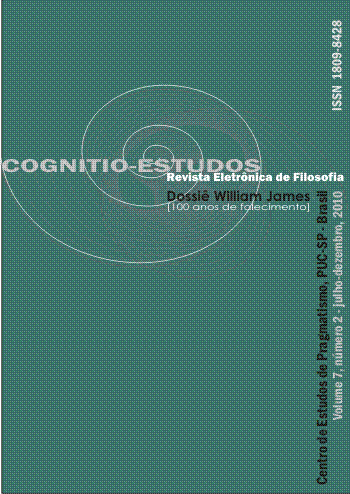Uma nova (e mais simples) resposta ao argumento do quarto chinês de Searle
Palavras-chave:
Filosofia da Mente. Argumento do Quarto Chinês. Inteligência Artificial.Resumo
Analisa-se o argumento do quarto chinês de John Searle, as contra-argumentações feitas e propõe-se uma nova resposta, fundamentada na noção de isodinamismo entre mentes (seres humanos) e máquinas. A discussão insere-se no campo da Filosofia da Mente e trata de uma das questões centrais dessa área – a possibilidade da mente ser reproduzida em materialidades inorgânicas e inumanas.Métricas
Carregando Métricas ...
Referências
CHOMSKY, Noam. Novos horizontes no estudo da linguagem e da mente. São Paulo: Editora UNESP, 2005.
DENNETT, Daniel C. Consciousness explained. New York: Back Bay Books, 1991.
DESCARTES, René. Discurso sobre o método: para bem dirigir a própria razão e procurar a verdade nas ciências. Curitiba: Hemus, 1614/2000.
FODOR, Jerry A. The modularity of mind. Cambridge, USA: A Bradford Book, 1996.
GÖDEL, Kurt. On formally undecidable propositions of Principia Mathematica and related systems. New York: Dover Publications Inc., 1992.
HOFSTADTER, Douglas R. Gödel, Escher, Bach: um entrelaçamento de gênios brilhantes. Brasília: Editora Universidade de Brasília; São Paulo: Imprensa Oficial do Estado, 2001.
McCULLOCH, Warren S.; PITTS, Walter. A logical calculus of the ideas immanent in nervous activity. In: CUMMINS, Robert; CUMMINS, Denise Dellarosa (Org.). Minds, Brains and Computers: the foundations of cognitive science, an anthology. Malden, USA: Blackwell Publishers Inc., 2000. 19p.
TEIXEIRA, João de Fernandes. Mente cérebro e cognição. Petrópolis,RJ: Vozes, 2000.
______. Filosofia e ciência cognitiva. Petrópolis, RJ: Vozes, 2004.
TURING, Alan. Computação e inteligência. In: TEIXEIRA, João de Fernandes. Cérebros, máquinas e consciência: uma introdução à filosofia da mente. São Carlos, SP: EDUFSCar, 1996. 16p.
TURING, Alan. On computable numbers, with an application to the Entscheidungsproblem (1936). In: COPELAND, B. Jack (Org.). The essential Turing: the ideas that gave birth to the computer age. Oxford: Clarendon Press, 2004. 32p.
______. Intelligent Machinery, a Heretical Theory (1945). In: COPELAND, B. Jack. (Org.). The essential Turing: the ideas that gave birth to the computer age. Oxford: Clarendon Press, 2004. 34p.
______. Lecture on the Automatic Computing Engine (1947). In: COPELAND, B. Jack. (Org.). The essential Turing: the ideas that gave birth to the computer age. Oxford: Clarendon Press, 2004. 28p.
TURING, Alan. Intelligent Machinery: a report (1948). In: COPELAND, B. Jack. (Org.). The essential Turing: the ideas that gave birth to the computer age. Oxford: Clarendon Press, 2004. 27p.
______. Can automatic calculating machines be said to think? (1952). In: COPELAND, B. Jack. (Org.). The essential Turing: the ideas that gave birth to the computer age. Oxford: Clarendon Press, 2004. 17p.
______. Chess (1953). In: COPELAND, B. Jack. (Org.). The essential Turing: the ideas that gave birth to the computer age. Oxford: Clarendon Press, 2004. 18p.
VON NEUMANN, John. O computador e o cérebro. Lisboa: Relógio d’Água Editores, 2005.
WITTGENSTEIN, Ludwig. Tractatus Lógico-Philosophicus. São Paulo: Editora da Universidade de São Paulo, 2001.
DENNETT, Daniel C. Consciousness explained. New York: Back Bay Books, 1991.
DESCARTES, René. Discurso sobre o método: para bem dirigir a própria razão e procurar a verdade nas ciências. Curitiba: Hemus, 1614/2000.
FODOR, Jerry A. The modularity of mind. Cambridge, USA: A Bradford Book, 1996.
GÖDEL, Kurt. On formally undecidable propositions of Principia Mathematica and related systems. New York: Dover Publications Inc., 1992.
HOFSTADTER, Douglas R. Gödel, Escher, Bach: um entrelaçamento de gênios brilhantes. Brasília: Editora Universidade de Brasília; São Paulo: Imprensa Oficial do Estado, 2001.
McCULLOCH, Warren S.; PITTS, Walter. A logical calculus of the ideas immanent in nervous activity. In: CUMMINS, Robert; CUMMINS, Denise Dellarosa (Org.). Minds, Brains and Computers: the foundations of cognitive science, an anthology. Malden, USA: Blackwell Publishers Inc., 2000. 19p.
TEIXEIRA, João de Fernandes. Mente cérebro e cognição. Petrópolis,RJ: Vozes, 2000.
______. Filosofia e ciência cognitiva. Petrópolis, RJ: Vozes, 2004.
TURING, Alan. Computação e inteligência. In: TEIXEIRA, João de Fernandes. Cérebros, máquinas e consciência: uma introdução à filosofia da mente. São Carlos, SP: EDUFSCar, 1996. 16p.
TURING, Alan. On computable numbers, with an application to the Entscheidungsproblem (1936). In: COPELAND, B. Jack (Org.). The essential Turing: the ideas that gave birth to the computer age. Oxford: Clarendon Press, 2004. 32p.
______. Intelligent Machinery, a Heretical Theory (1945). In: COPELAND, B. Jack. (Org.). The essential Turing: the ideas that gave birth to the computer age. Oxford: Clarendon Press, 2004. 34p.
______. Lecture on the Automatic Computing Engine (1947). In: COPELAND, B. Jack. (Org.). The essential Turing: the ideas that gave birth to the computer age. Oxford: Clarendon Press, 2004. 28p.
TURING, Alan. Intelligent Machinery: a report (1948). In: COPELAND, B. Jack. (Org.). The essential Turing: the ideas that gave birth to the computer age. Oxford: Clarendon Press, 2004. 27p.
______. Can automatic calculating machines be said to think? (1952). In: COPELAND, B. Jack. (Org.). The essential Turing: the ideas that gave birth to the computer age. Oxford: Clarendon Press, 2004. 17p.
______. Chess (1953). In: COPELAND, B. Jack. (Org.). The essential Turing: the ideas that gave birth to the computer age. Oxford: Clarendon Press, 2004. 18p.
VON NEUMANN, John. O computador e o cérebro. Lisboa: Relógio d’Água Editores, 2005.
WITTGENSTEIN, Ludwig. Tractatus Lógico-Philosophicus. São Paulo: Editora da Universidade de São Paulo, 2001.
Downloads
Publicado
2010-11-04
Como Citar
Guimarães, A. S. (2010). Uma nova (e mais simples) resposta ao argumento do quarto chinês de Searle. Cognitio-Estudos: Revista eletrônica De Filosofia, 7(2), 132–140. Recuperado de https://revistas.pucsp.br/index.php/cognitio/article/view/3269
Edição
Seção
Artigos

